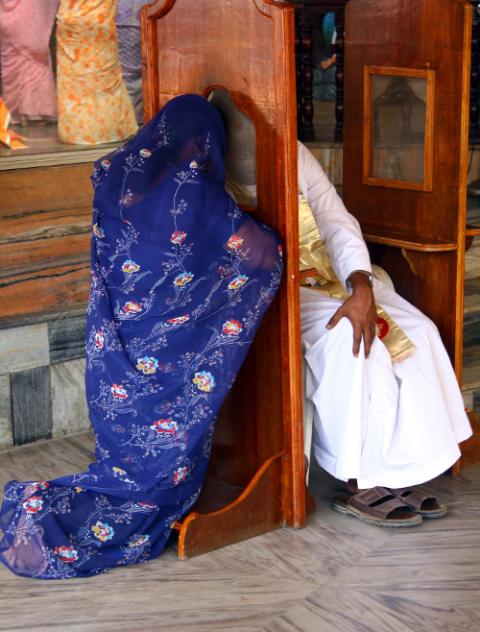
Confessionals, left, line the wall of a church. (Wikimedia/Creative Commons)
The desire to protect children from abuse, both sexual and physical, has led many states to designate certain classes of people as mandatory reporters, even threatening them with jail time if they fail to report abuse.
These laws vary from state to state in terms of who are listed as mandatory reporters and what they are required to report. Mandatory reporters have included teachers, nurses, doctors, child welfare officials and police. Even psychologists and psychiatrists, who normally must respect the confidentiality of what they are told by their patients, have sometimes been covered.
Because of the failure of Catholic bishops in the past to report abusive priests to authorities, states are now also including Catholic clergy as mandatory reporters.
Most bishops do not oppose making Catholic clergymen mandatory reporters except when it comes to what a priest hears in the sacrament of confession. For centuries, church law has forbidden priests to break the seal of confession, to reveal what they hear in confession. Breaking the seal is considered a grave sin, which cannot be forgiven by an ordinary priest or bishop but is reserved to a Vatican tribunal known as the Apostolic Penitentiary.
This confidentiality of confession was respected by Western nations for centuries, considering it on a par with client-attorney confidentiality. Note that no state is proposing that lawyers be mandatory reporters of what they learn about sexual abuse from their clients.
The confidentiality of confession was central to Alfred Hitchcock's 1953 film "I Confess," where the priest is accused of murder and cannot use the information he received in confession to defend himself. More recently, the 2014 Irish film "Calvary" features a penitent who tells the priest that he is going to kill him. Central to both films is the Catholic teaching that a priest must die rather than reveal what he hears in confession.
If states do not exempt confession under the mandatory reporting rules, priests will have to go to jail rather than divulge what they heard in confession.

A priest hears a woman’s confession. (Wikimedia/Creative Commons)
Covering confession under mandatory reporting rules would have little effect even if priests did report. Few would confess such a sin if they thought their confidences were not secure. Many pedophiles, anyway, are so delusional that they do not think what they are doing is wrong, and therefore do not confess.
Finally, it's not often that a priest can identify who is confessing to him. A penitent could find a priest who does not know him and confess in a confessional box where there is an opaque screen between him and the priest, which would ensure anonymity.
Many non-Catholics think of confession as a get-out-of-jail-free card: Do whatever you want; confess it; and do it again. This projects visions of drug lords confessing on a regular basis while continuing to run their criminal enterprises.
In fact, for forgiveness, Catholic confession requires "firm purpose of amendment," a sincere effort not to sin again. For the sex abuser this means no forgiveness if he does not stop. If it is a compulsive behavior, he must do everything to stop, even if that means turning himself in to authorities.
More difficult is the case of a victim telling a confessor of abuse. The victim is obviously not a sinner, but the seal of confession still covers whatever is said. Here the priest must encourage the child to tell a parent, teacher, counselor, police officer, or even to repeat the story to the priest outside of confession. This ensures that something is done to protect the child.
The seal of confession is comprehensive. A priest cannot divulge who was or was not in the confessional, what was said or what was not said. Thus, if a priest was put on the stand, he could not testify that the accused had never mentioned abuse in confession; he could not even deny he ever heard the accused's confession. Basically, he can say nothing. He is of no use to the prosecution or the defense.
(For the complicated issue of whether a penitent can release his confessor from the seal, see "Seal of confession on the court docket.")
Advertisement
Exempting what a priest hears in confession does not have to extend to what a priest learns in a counseling session or while doing spiritual direction. Here a priest could be covered by the same rules as cover psychologists and psychiatrists.
As a priest, I have been advised to tell counselees: "I want you to know that most of what you say to me is strictly confidential. I would only break this confidentiality when or if you might hurt yourself, others, or tell me about the abuse of a minor or vulnerable person. OK?"
Because laws vary from state to state, we need to have a national conversation over disclosure laws with input from victims, legal scholars and those covered.
For example, are rumors included or just credible accusations?
And while everyone would agree that the abuse of a child should be reported, what if the information comes from an adult survivor who does not want the crime reported?
Some survivors are not ready to report when they first seek professional help for their trauma. After some counseling, they might be ready to report. Would they be scared off from getting help because of mandatory reporting rules?
For example, an adult survivor might seek therapy, but not want his parents, spouse or children to know that he was abused. If his parents invited the priest into their home, they would be devastated to learn that the priest had abused their child. The survivor might not want to inflict that pain on his parents.
It would be tragic if he was discouraged from getting help because the priest, psychologist or psychiatrist was required to report. Here it might make a difference if the statute of limitations had expired or the priest was dead, in jail or out of ministry.
Priests, like psychologists and psychiatrists, should be covered by mandatory reporting rules with an exemption for confession, but there needs to be a serious discussion of exactly what should be covered. In these discussions the victims should have a prominent role.
[Jesuit Fr. Thomas Reese is a columnist for Religion News Service and author of Inside the Vatican: The Politics and Organization of the Catholic Church.]




